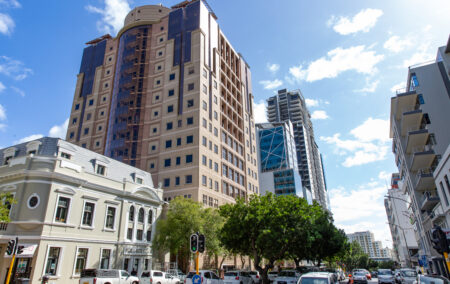Business conditions in Cape Town’s central business district have fully recovered from the devastating impact of Covid and the associated lockdowns, with retailers “no longer (needing) to focus on cost-cutting to thrive”.
So says Rob Kane, chairperson of the Cape Town Central City Improvement District (CCID) board.
Kane was commenting on the results of the latest Business Confidence Index, conducted every quarter among retailers in all major retail categories in the CCID’s 1.6 km² geographical footprint in downtown Cape Town.
The results show that business confidence in the central city soared in the first two quarters of 2024, with the vast majority of inner-city retailers reporting they are “satisfied” with business conditions.
In a statement, the CCID said 90% of respondents were content with the status quo, and the majority of the over 200 businesses surveyed (75%) “anticipate that business activity will continue to improve during the final months of the year”.
This followed “solid growth” in 2023, with retailers expressing confidence that business activity had fully recovered from the Covid pandemic – in contrast to many CBDs around the world − and that 2024 would be a year of growth and consolidation.
This was a key theme in the recently released State of Cape Town Central City Report 2023 – A year in review (SCCR), published annually by the CCID. The report gives a breakdown of how various sectors that drive the downtown economy fared in 2023, from commercial and residential property investment to the retail sector, visitor and hospitality sectors, business tourism and events.
Kane says: “The report shows that business is flourishing in the Cape Town CBD. By the end of 2023, half of the retailers surveyed felt that business activity had fully recovered from the pandemic, while 44% said it had almost recovered and only 6% said it had not.”
In Q4 23, 93% of survey respondents said they were satisfied with business conditions, as improved weather and an influx of tourists boosted business activity in the Central City. After easing back to a still elevated 89.8% in Q1 24, confidence levels inched higher again in Q2 24 rising to 90%.
During the first two years of Covid-19, the quarterly survey revealed how retailers reduced their overheads, trading hours and staff numbers as they adjusted to subdued levels of activity.
Kane adds: “Trading conditions have steadily normalised over the years, and businesses no longer need to focus on cost-cutting to thrive. By the end of 2023, 75% of the 253 businesses surveyed had no plans to adjust their businesses during 2024, with 10% planning to employ more staff and 6% planning to extend their trading hours.”
In the Q1 of 2024, 87.2% of survey respondents said they had no changes planned for their businesses.
“This shifted significantly in the second quarter, with only 46.6% of survey respondents indicating no planned changes. These results are encouraging as 17.7% of respondents plan to increase their staff numbers and 22.8% of respondents intend to grow their e-commerce capabilities,” says Kane.
In 2024 respondents were asked what their expectations were for their businesses in the year ahead.
Despite the current tough economic conditions in South Africa, 75% of respondents in the Q2 24 survey anticipate that their businesses will perform better during the second half of 2024, up from 71.5% in Q1. A further 24.5% expect conditions to remain unchanged, while just 0.5% think business conditions will deteriorate, down from 3.4% in Q1 24.
Says Kane: “According to Stats SA retail sales experienced a cautious upward trajectory in the three months from April to June. This uptick indicates increased consumer confidence possibly stemming from the cessation of load-shedding in March, the petrol price cut in June, and positive sentiment around the national election results. The expectation of interest rate cuts in September and some easing of inflation pressure also bodes well for retail sales in the second half of 2024.”
Kane notes that the “growing number of short-term residential developments and aparthotels coupled with the return of local and international tourists to Cape Town has revived business activity for local retailers”.
“By the end of 2023, the number of retailers in the CBD rose to 1 305 – up by 62 business entities compared with the 1 243 in 2022 – and surpassing the pre-Covid-19 number of 1 237 in 2019.
“With the majority of retailers satisfied with trading conditions, a growing consumer base and the city centre’s vibrant and unique mix of destination shops and venues, retailers in the Central City are experiencing another successful trading year in 2024,” concludes Kane.
[Image: CCID]


